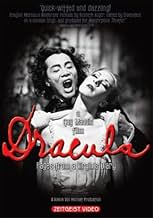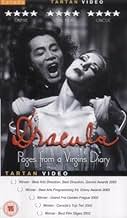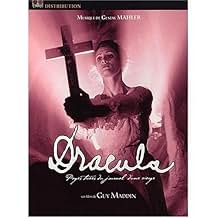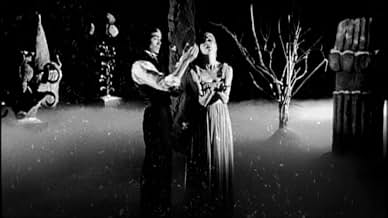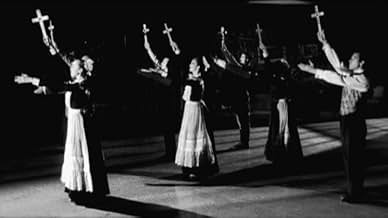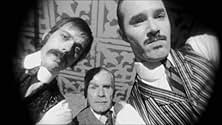Dracula: Pages from a Virgin's Diary
- 1h 13m
IMDb RATING
6.8/10
2.3K
YOUR RATING
A ballet rendition of Bram Stoker's "Dracula", stylized as an Expressionistic silent film.A ballet rendition of Bram Stoker's "Dracula", stylized as an Expressionistic silent film.A ballet rendition of Bram Stoker's "Dracula", stylized as an Expressionistic silent film.
- Awards
- 4 wins & 2 nominations total
Wei-Qiang Zhang
- Dracula
- (as Zhang Wei-Qiang)
Johnny A. Wright
- Jonathon Harker
- (as Johnny Wright)
- Director
- Writers
- All cast & crew
- Production, box office & more at IMDbPro
6.82.3K
1
2
3
4
5
6
7
8
9
10
Featured reviews
Surprisingly traditional, but worth a watch for horror and silent film fans
Dracula: Pages from a Virgin's Diary is a silent version of author Bram Stoker's Dracula that also incorporates many ballet-oriented scenes.
My two principle reactions to the film were surprise and delight. I was surprised that the film is so traditional--the silent footage often looks like one is simply watching a film from the 1910s or 1920s. This is heightened by the score, which is extremely conservative, traditional classical music. This surprised me because the Sundance Channel promos for the film kept repeating, ". . . from avant-garde director Guy Maddin". There is not much avant-garde about this film, either in the literal translation of that phrase, as "new wave", or in the more popular sense of "experimental/uncompromisingly different and unusual". Dracula: Pages from a Virgin's Diary is decidedly old wave, and never more experimental, different or unusual than a couple small production design touches that might have been gleaned by anyone who is a big fan of Terry Gilliam's Brazil (1985) and Francis Ford Coppola's Rumble Fish (1983).
Even citing those two influences might be misleading. The Brazil influence is primarily present in a single device--Mrs. Westerna's (Stephanie Ballard) ventilator, and the Rumble Fish influence primarily in the recurrence of red (and occasionally green and gold) within the context of mostly black and white photography (with occasional, very traditional silent film tinting for various scenes). But Dracula: Pages from a Virgin's Diary is so traditional that Maddin frequently even went for German expressionist influenced set design. The sets are wonderful at that, however, and occasional they're more surreal.
It's not that the film is bad for being so traditional, but it took me awhile to adjust my preconceptions, which were misled from the Sundance promo. However, the silent film aspect didn't exactly work well for me, either, and the ballet was a bit blase when it was present, which was less often than I expected. Most of the time I was wondering what the motivation was for the silent film aspect, aside from an exercise in nostalgia and/or cribbing a style of a bygone era, like trying to create a painting that looks almost exactly like Titian, say. On the other hand, it was effective in a couple instances, such as one decapitation-by-shovel (shot from an angle that allowed for minimal gore, to my dismay), where Maddin introduced foley "sound effects" that amped up the impact of the scene. The instances of bright red in the cinematography were also very effective, and not dissimilar to M. Night Shyamalan's The Village (2004), which postdates this film by 2 years.
My delight reaction arose when I realized that much of Dracula: Pages from a Virgin's Diary can be read as an anti-immigration parable. This help explains why Dracula is Chinese here, rather than East European. Under this interpretation, the immigrant Others are invading white Anglo-Saxon shores, usurping authority, "stealing" women and economic power, and so on. It's also notable that Maddin's means of dispatching Dracula in the film is very similar to punishments meted out by Dracula's real-life basis, Vlad Tepes, aka "Vlad the Impaler" (and aka "Dracula" by the way). One popular theory has it that Vlad the Impaler's motivation for his atrocities was primarily to protect the integrity of his Wallachian burg, against what he saw as foreign political and cultural invaders. This makes Dracula's finale in the film fittingly ironic in light of the anti-immigration subtext.
Maddin's film is also interesting for presenting the story in two halves, the first solely centered on Lucy Westerna (Tara Birtwhistle), and the second on Jonathan Harker (Johnny Wright) and Mina (Cindy Marie Small). A pervert rendition of Dr. Van Helsing (Dave Moroni) was also unusual and amusing, but Renfield (Brent Neale) was mostly wasted.
Of course a potential audience for Dracula: Pages from a Virgin's Diary has to be amenable to silent films, and not averse to ballet or traditional classical music. If you fit that bill and you have a taste for horror or an interest in Dracula, this film may be just up your alley.
My two principle reactions to the film were surprise and delight. I was surprised that the film is so traditional--the silent footage often looks like one is simply watching a film from the 1910s or 1920s. This is heightened by the score, which is extremely conservative, traditional classical music. This surprised me because the Sundance Channel promos for the film kept repeating, ". . . from avant-garde director Guy Maddin". There is not much avant-garde about this film, either in the literal translation of that phrase, as "new wave", or in the more popular sense of "experimental/uncompromisingly different and unusual". Dracula: Pages from a Virgin's Diary is decidedly old wave, and never more experimental, different or unusual than a couple small production design touches that might have been gleaned by anyone who is a big fan of Terry Gilliam's Brazil (1985) and Francis Ford Coppola's Rumble Fish (1983).
Even citing those two influences might be misleading. The Brazil influence is primarily present in a single device--Mrs. Westerna's (Stephanie Ballard) ventilator, and the Rumble Fish influence primarily in the recurrence of red (and occasionally green and gold) within the context of mostly black and white photography (with occasional, very traditional silent film tinting for various scenes). But Dracula: Pages from a Virgin's Diary is so traditional that Maddin frequently even went for German expressionist influenced set design. The sets are wonderful at that, however, and occasional they're more surreal.
It's not that the film is bad for being so traditional, but it took me awhile to adjust my preconceptions, which were misled from the Sundance promo. However, the silent film aspect didn't exactly work well for me, either, and the ballet was a bit blase when it was present, which was less often than I expected. Most of the time I was wondering what the motivation was for the silent film aspect, aside from an exercise in nostalgia and/or cribbing a style of a bygone era, like trying to create a painting that looks almost exactly like Titian, say. On the other hand, it was effective in a couple instances, such as one decapitation-by-shovel (shot from an angle that allowed for minimal gore, to my dismay), where Maddin introduced foley "sound effects" that amped up the impact of the scene. The instances of bright red in the cinematography were also very effective, and not dissimilar to M. Night Shyamalan's The Village (2004), which postdates this film by 2 years.
My delight reaction arose when I realized that much of Dracula: Pages from a Virgin's Diary can be read as an anti-immigration parable. This help explains why Dracula is Chinese here, rather than East European. Under this interpretation, the immigrant Others are invading white Anglo-Saxon shores, usurping authority, "stealing" women and economic power, and so on. It's also notable that Maddin's means of dispatching Dracula in the film is very similar to punishments meted out by Dracula's real-life basis, Vlad Tepes, aka "Vlad the Impaler" (and aka "Dracula" by the way). One popular theory has it that Vlad the Impaler's motivation for his atrocities was primarily to protect the integrity of his Wallachian burg, against what he saw as foreign political and cultural invaders. This makes Dracula's finale in the film fittingly ironic in light of the anti-immigration subtext.
Maddin's film is also interesting for presenting the story in two halves, the first solely centered on Lucy Westerna (Tara Birtwhistle), and the second on Jonathan Harker (Johnny Wright) and Mina (Cindy Marie Small). A pervert rendition of Dr. Van Helsing (Dave Moroni) was also unusual and amusing, but Renfield (Brent Neale) was mostly wasted.
Of course a potential audience for Dracula: Pages from a Virgin's Diary has to be amenable to silent films, and not averse to ballet or traditional classical music. If you fit that bill and you have a taste for horror or an interest in Dracula, this film may be just up your alley.
experiment in ballet and silent film
Lucy Westernra is engaged to marry Lord Arthur Holmwood. However, an evil comes out of the east. She is bitten by Dracula. Vampyr-hunter Abraham Van Helsing arrives to clear out her polluted blood. Mental patient Renfield's escape leads to a massacre. Dracula reanimates Lucy. Van Helsing and the men hunt for Lucy and then finally Dracula himself.
Filmmaker Guy Maddin continues his experimentation. This is mostly black and white with splashes of bright colors. It is a silent film with many of its conventions such as title cards and era appropriate special effects. The ballet dancing can be hypnotic. The story follows the traditional Bram Stoker's Dracula with its xenophobia. It is definitely not for everyone and my fascination with the movie does wear out in the second half. Nevertheless, this is a worthy experiment.
Filmmaker Guy Maddin continues his experimentation. This is mostly black and white with splashes of bright colors. It is a silent film with many of its conventions such as title cards and era appropriate special effects. The ballet dancing can be hypnotic. The story follows the traditional Bram Stoker's Dracula with its xenophobia. It is definitely not for everyone and my fascination with the movie does wear out in the second half. Nevertheless, this is a worthy experiment.
If you like ballet and like cinema then you'll find you should like this
At the end of the 19th Century, immigrants come into England, not all of them gentle. One such immigrant is the evil Dracula who claims his first victim, Miss Lucy Westenra. Her three suitors call for help from Dr Van Helsing, but it is too late and she turns to vampire. They set out to kill her for good, but can they prevent Dracula claiming his next victim - Westenra's cousin Mina?
As part of my approach to films, I try to not just watch the big new releases or the well known smaller films, but I'll give things a try even if I know little about them but they sound OK. I'll admit that I have been burnt by this on many occasions but this time it worked out for the best. I'm not a big ballet fan, but I enjoyed this film as it mixed the ballet into a story that was told very easily though dance and closed captions. The fact that it was a very cinematic ballet really helped me get into it - the film's style is a homage of sorts to silent film, in it's filming, caption cards and whole look. I like this and it made it more interesting to me. Even the exaggerated looks on he casts' faces reminded me of the silent movies.
The actual ballet in the film is mixed. Some scenes are excellent and flow so very easily, the best by far being Dracula's final dance with Mina. However other parts are not so strong and the motion is not well captured by the camera, which itself seems to want to get in on all the motion and doesn't stay still long enough to really let the eye take in the movement. Happily this is the minority of the scenes as most of it is very nice to watch.
The direction of the ballet is good, but so is the direction of the film. The style captures the silent era well but also has enough clever touches in it to keep it fresh. The tinting of frames and selective use of colour make for interesting flourishes without over doing it. The cast also do reasonably well but are mixed. Zhang is magnificent in both his portrayal of Dracula and his ballet. Most of he rest of the cast do well, but only Birtwhistle (Westenra) and Moroni (Helsing) really stand out for their skills and characters. The support has no weak links in fairness and everyone does what is required of them.
The bottom line is, if you don't like ballet, then you probably won't like this film. If you do like ballet and also like cinema then you should take something from this. For me, I enjoyed the ballet as part of the story telling process but also got a kick out of seeing a silent movie version of Dracula done with modern touches.
As part of my approach to films, I try to not just watch the big new releases or the well known smaller films, but I'll give things a try even if I know little about them but they sound OK. I'll admit that I have been burnt by this on many occasions but this time it worked out for the best. I'm not a big ballet fan, but I enjoyed this film as it mixed the ballet into a story that was told very easily though dance and closed captions. The fact that it was a very cinematic ballet really helped me get into it - the film's style is a homage of sorts to silent film, in it's filming, caption cards and whole look. I like this and it made it more interesting to me. Even the exaggerated looks on he casts' faces reminded me of the silent movies.
The actual ballet in the film is mixed. Some scenes are excellent and flow so very easily, the best by far being Dracula's final dance with Mina. However other parts are not so strong and the motion is not well captured by the camera, which itself seems to want to get in on all the motion and doesn't stay still long enough to really let the eye take in the movement. Happily this is the minority of the scenes as most of it is very nice to watch.
The direction of the ballet is good, but so is the direction of the film. The style captures the silent era well but also has enough clever touches in it to keep it fresh. The tinting of frames and selective use of colour make for interesting flourishes without over doing it. The cast also do reasonably well but are mixed. Zhang is magnificent in both his portrayal of Dracula and his ballet. Most of he rest of the cast do well, but only Birtwhistle (Westenra) and Moroni (Helsing) really stand out for their skills and characters. The support has no weak links in fairness and everyone does what is required of them.
The bottom line is, if you don't like ballet, then you probably won't like this film. If you do like ballet and also like cinema then you should take something from this. For me, I enjoyed the ballet as part of the story telling process but also got a kick out of seeing a silent movie version of Dracula done with modern touches.
Dancing vampire.
It's definitely true that when you know absolutely nothing about this movie beforehand, it might come as a bit of a shocker. It's a ballet version of the Dracula story and if that wasn't already enough originality and strangeness, it's also shot in a silent movie style.
Actually, I already was familiar with some of Guy Maddin's other work, so I sort of knew what to expect from this movie already. He's a director that loves to shoot his movies in a very stylish and old fashioned style, often from the silent movie era. But it's not like he just mimics the style, he makes it completely his own. It's like he's always giving his own free interpretation of the genre and completely reinvents it instead. Saying that this movie is done in an old fashioned style does not mean you could compare it to older movies as well. It's very much its own thing, which is also the foremost reason why this movie works out so well.
Basically the foremost reason why this movie is such an intriguing and perfectly watchable one, are its visuals. It's a spectacular movie to look at, even though it's almost entirely shot in black & white. The camera-work is very innovative and also helps to keep the movie going at all times.
It was also quite interesting to see the familiar story being told for most part from the viewpoint of the Lucy Westernra character. This was actually a very good idea in my opinion, since her character perhaps goes through the biggest transformations and is one of the more interesting, yet mostly ignored, characters from the Dracula story.
What also was quite interesting was seeing an Asian in the role of Dracula. It sounds odd but it actually was something that worked out quite well. Wei-Qiang Zhang, as it turned out, was a very charismatic choice, for the role of the well known and much portrayed blood sucking count.
And as far as ballet goes; this movie does mostly a good job at keeping things understandable and not all about its dancing and exaggerated expressions from its actors. But I should probably say that if you aren't familiar at all with the Dracula story, you probably will still have a hard time following the story in this movie. But then again, who isn't familiar with the Dracula story now days?
I should also probably admit that if the movie would had been any longer, I would had had a hard time finishing it. The movie as it is at times feels sort of overlong already, even while its only 73 minutes short. Watching a completely silent movie, with dancing characters, gets a bit of an endurance test after a while I guess but it still remains an ultimately rewarding movie, by the end.
Visually and technically speaking, its a great and interesting, original movie, that might not keep everybody constantly interested though.
7/10
http://bobafett1138.blogspot.com/
Actually, I already was familiar with some of Guy Maddin's other work, so I sort of knew what to expect from this movie already. He's a director that loves to shoot his movies in a very stylish and old fashioned style, often from the silent movie era. But it's not like he just mimics the style, he makes it completely his own. It's like he's always giving his own free interpretation of the genre and completely reinvents it instead. Saying that this movie is done in an old fashioned style does not mean you could compare it to older movies as well. It's very much its own thing, which is also the foremost reason why this movie works out so well.
Basically the foremost reason why this movie is such an intriguing and perfectly watchable one, are its visuals. It's a spectacular movie to look at, even though it's almost entirely shot in black & white. The camera-work is very innovative and also helps to keep the movie going at all times.
It was also quite interesting to see the familiar story being told for most part from the viewpoint of the Lucy Westernra character. This was actually a very good idea in my opinion, since her character perhaps goes through the biggest transformations and is one of the more interesting, yet mostly ignored, characters from the Dracula story.
What also was quite interesting was seeing an Asian in the role of Dracula. It sounds odd but it actually was something that worked out quite well. Wei-Qiang Zhang, as it turned out, was a very charismatic choice, for the role of the well known and much portrayed blood sucking count.
And as far as ballet goes; this movie does mostly a good job at keeping things understandable and not all about its dancing and exaggerated expressions from its actors. But I should probably say that if you aren't familiar at all with the Dracula story, you probably will still have a hard time following the story in this movie. But then again, who isn't familiar with the Dracula story now days?
I should also probably admit that if the movie would had been any longer, I would had had a hard time finishing it. The movie as it is at times feels sort of overlong already, even while its only 73 minutes short. Watching a completely silent movie, with dancing characters, gets a bit of an endurance test after a while I guess but it still remains an ultimately rewarding movie, by the end.
Visually and technically speaking, its a great and interesting, original movie, that might not keep everybody constantly interested though.
7/10
http://bobafett1138.blogspot.com/
In context, this is a pretty amazing DVD.
Had "Dracula: Pages from a Virgin's Diary" been made in Hollywood of with a huge budget, I don't think I would have been as favorably disposed towards the project. After all, the DVD is a bit rough here and there--credits shake a bit and a few of the computer effects (especially superimpositions) are very rough. BUT, you must realize that this is a production of the Royal Winnepeg Ballet. And, while it's a very well-respected and quality production company, it wasn't like these were seasoned filmmakers. So, I cut it a lot of slack. Based on this, it's actually a rather incredible production--with lovely sets, great costumes and a nice Gothic horror/romantic look about it. Heck, I hate opera and I still appreciated the amazing task they did in creating something like this. Probably not for everyone, but using modern dance and ballet, it does make a sophisticated art form more approachable to the masses.
Did you know
- TriviaSarah Murphy-Dyson's debut.
- ConnectionsReferenced in Guy Maddin: His Winnipeg (2014)
- SoundtracksSymphony #1 (excerpts)
By Gustav Mahler
- How long is Dracula: Pages from a Virgin's Diary?Powered by Alexa
Details
- Release date
- Country of origin
- Official site
- Language
- Also known as
- Drácula - El diario de una virgen
- Filming locations
- Production companies
- See more company credits at IMDbPro
Box office
- Budget
- $1,600,000 (estimated)
- Gross US & Canada
- $55,365
- Opening weekend US & Canada
- $4,784
- May 18, 2003
- Gross worldwide
- $55,365
- Runtime
- 1h 13m(73 min)
- Color
- Sound mix
- Aspect ratio
- 1.85 : 1
Contribute to this page
Suggest an edit or add missing content

